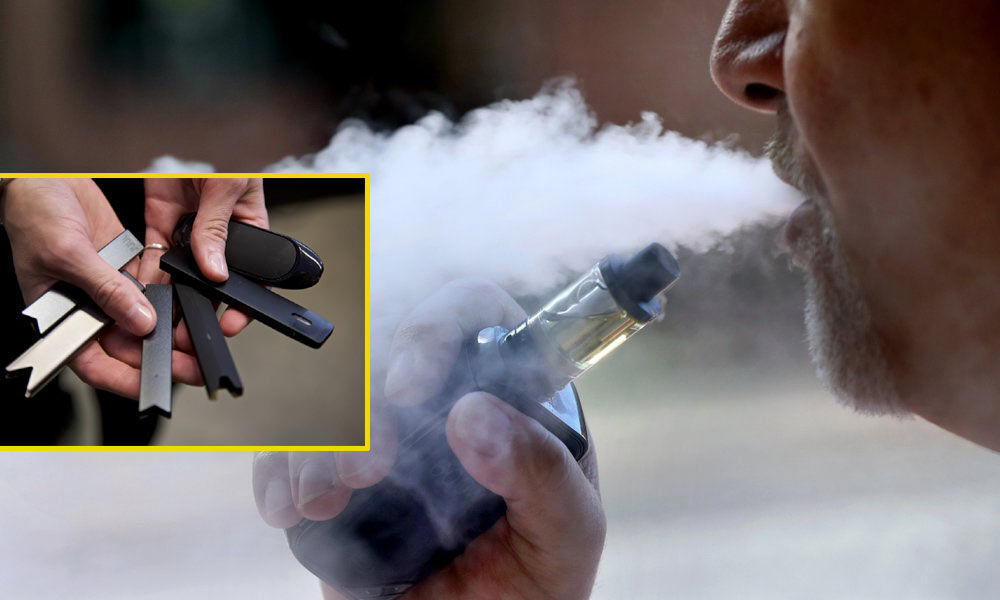Live
- Activist Harassed and Attacked While Documenting Elephant’s Ordeal at Tamil Nadu Temple
- BJP Accuses Congress of Incorrect India Map on Posters, Slams 'Mohabbat ki Dukaan' for Appeasing China
- DIGIDHAN Mission driving India’s leadership role in digital payments: Finance Ministry
- KLH Bachupally Campus Students Showcase Outstanding Athletic Talent and Achievements
- ITC HOTELS’ OPEN WELCOM HOTEL JABALPUR IN MADHYA PRADESH
- Hyundai IONIQ 5 takes part in GUINNESS WORLD RECORDS™ title for the Greatest altitude change by an electric car
- Xiaomi Pad 7 India Launch on January 10: Expected Price, Specifications, Features, and More
- Muzigal launches its State-of-the-art Music Academy in Miyapur, Hyderabad.
- AP Weather Alert: Meteorological Department Issues Rain Warning for Next 2 Days
- Toyota Kirloskar Motor Unveils “Happier Paths Together” – A Corporate Campaign Championing Happiness for All
Just In
Oregon death is primarily linked 1st to pot shop, next to vaping.


Public health officials in Oregon said Wednesday that a person who recently died of severe respiratory illness had used an electronic cigarette containing marijuana oil from a legal dispensary, the second death linked to vaping nationwide and the first tied to a vaping product bought at a pot shop.
PORTLAND, Ore: Public health officials in Oregon said Wednesday that a person who recently died of severe respiratory illness had used an electronic cigarette containing marijuana oil from a legal dispensary, the second death linked to vaping nationwide and the first tied to a vaping product bought at a pot shop.
Officials have not determined what sickened the middle-aged adult, whether the product was contaminated or whether they may have added something to the liquid in the device after buying it, said Dr. Ann Thomas with the Oregon Health Authority.
Thomas declined to name the brand of the product or the dispensary during the investigation and said it's the only case of vaping-related illness or death in Oregon that authorities know about.
"Our investigation has not yielded exactly what it is in this product," Thomas said. "At this point, some of the other states have more data than us."
As of last week, 215 possible cases of severe lung disease associated with the use of e-cigarettes had been reported by 25 states, according to the federal Centers for Disease Control and Prevention. The battery-powered vaping devices can be used to inhale a flavoured nicotine solution or a solution infused with marijuana oil.
Illinois officials on Friday reported what they consider the first death in the nation linked to vaping after the person contracted serious lung disease. They didn't say if the e-cigarette contained marijuana oil or just nicotine.
Health officials in some states have said a number of people who got sick had vaped products containing THC, the compound that gives marijuana its high.
That's a critical distinction in the Oregon case, according to the American Vaping Association, which has blamed the recent spate of lung illnesses on illegal vape pens that contain THC.
Wisconsin public health officials said late last month that 89% of the people they interviewed who became sick reported using e-cigarettes or other vaping devices to inhale THC.
In New York state, 32 cases of vaping-related illness have been reported, with a "vast majority" involving people who vape illicit marijuana. None has involved medical marijuana products sold in compliance with state law.
New York officials are focusing their investigation on an additive used in black-market vape oils made from vitamin E. A state health department spokeswoman said a lab has found "high levels" of vitamin E acetate in "nearly all" the marijuana samples involved.
Officials cautioned, however, that there have been respiratory illnesses diagnosed where the vaping product did not contain marijuana.
"It's kind of scary and it's hard to believe that any vaping is really safe at this point," said Thomas, the Oregon doctor.
In Oregon, where marijuana is broadly legal for adults 21 and older, dispensaries can't sell products that have not been tested by state-accredited labs.
Mark Pettinger, the spokesman for the Oregon Liquor Control Commission, which oversees Oregon's legal marijuana industry, said the investigation was in its early stages, but if it turns out the THC oil was implicated, his agency can track the product back to its origin and review all the testing results.
In general, all marijuana intended for sale at a legal dispensary is tested for pesticides and potency, as well as for solvents, if the product is not dried marijuana flower.
U.S. Sen. Ron Wyden of Oregon said he will introduce legislation next week that would tax e-cigarettes in the same way as traditional cigarettes to reduce the appeal to teenagers who are increasingly taking up the popular smoking alternative.
"The products are highly addictive. They're subject to minimal safety standards and oversights, exposing users to dangerous chemicals ... and they are getting into the hands of more and more young people," Wyden said.
The American Vaping Association said in a statement that vaping products are "far less harmful than smoking" and have helped people break their addiction to traditional cigarettes.
"Making vaping products more expensive has not been shown to reduce experimentation by youth and will only lead to more adults continuing to smoke deadly combustible cigarettes," association president Gregory Conley said in an email.
Health experts say nicotine is harmful to developing brains. Researchers worry that addicted teens will eventually switch from vaping to smoking.
Most experts agree the aerosol in e-cigarettes is less harmful than traditional cigarette smoke because it does not contain most of the cancer-causing byproducts of burning tobacco. But there is virtually no research on the long-term effects of the vaping chemicals, some of which are toxic.
___
Medical Writer Carla K. Johnson contributed from Seattle.

© 2024 Hyderabad Media House Limited/The Hans India. All rights reserved. Powered by hocalwire.com






